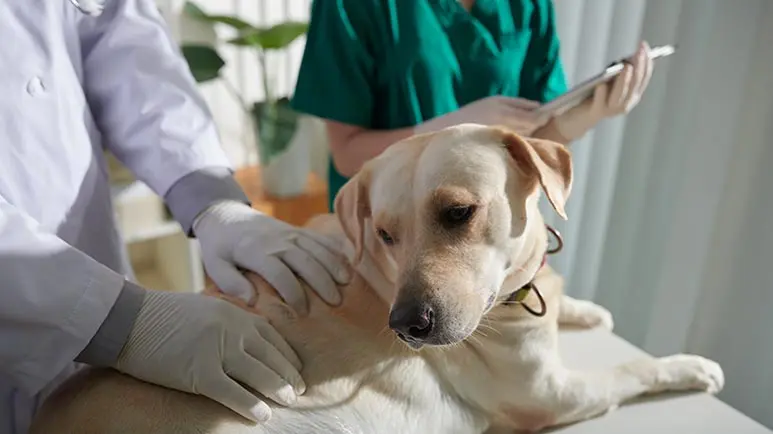Is Your Pet's Digestive Distress a Sign of Something Worse?
When your pet's gut is in disarray, the symptoms may not be easily recognizable. If left without treatment, it can progress and become chronic. Here’s how to spot the signs.

STORY AT-A-GLANCE
- IBS and IBD in pets cause similar symptoms like fatigue, flatulence, diarrhea and vomiting. IBS is intermittent inflammation, while IBD is chronic and can lead to more severe health issues
- Causes of digestive distress in pets include stress, dietary intolerance, lack of fiber, abnormal intestinal activity and possible genetic factors. Certain dog breeds may be more predisposed to gastrointestinal problems
- Common symptoms of IBS and IBD in pets include diarrhea, constipation, abdominal pain, nausea and bloating. IBD may also cause appetite loss, fatigue and unexplained weight loss
- Diagnosing IBS in pets can be challenging and time-consuming, as it requires ruling out other conditions with similar symptoms through various tests like blood work and stool examinations
- Treatment for pet digestive distress involves working with a veterinarian to develop a comprehensive plan, including dietary changes, probiotic supplements to promote gut health and possibly digestive enzymes to manage inflammation
Does your dog or cat seem less like themselves lately? If they look fatigued and have less energy, and are exhibiting symptoms like flatulence, diarrhea and/or vomiting, then the problem may be coming from within.
A condition that is common yet often ignored or undetected by most pet parents is irritable bowel syndrome (IBS). However, IBS is usually mistaken for irritable bowel disease (IBD), which is a different type of digestive disorder.
In this article, we’ll discuss the similarities and differences between these two conditions and what you can do to help ease your pet’s digestive distress.
IBD versus IBS — How to Tell Them Apart
Most people usually lump both IBD and IBS under the same condition. This isn’t surprising, as they usually cause the same types of symptoms in pets. However, there’s a significant distinction between these conditions.
Basically, IBS, also called a “sensitive stomach,” is an intermittent condition. It occurs when there’s inflammation in your dog’s or cat’s digestive system that comes and goes. On the other hand, IBD is an “advanced” version of IBS. This is when the inflammation in your pet’s intestine or digestive tract becomes chronic, meaning it does not go away.
Think of it this way — if your pet has irritable bowel syndrome, but you fail to address it, it will progress into full-blown irritable bowel disease.
The persistent inflammation brought on by IBD harms the lining of your pet’s digestive tract and prevents food from being digested properly. IBD can also lead to other health problems, as it can also hinder nutrient absorption.
Causes and Risk Factors of IBS and IBD
There are several different causes that can trigger digestive distress in companion animals. It can occur as a stress response to certain events or because of a dietary intolerance — meaning their gut does not respond well to certain foods.
Some pets that lack fiber in their diet also experience IBS. Unusual movements in the large intestine and changes in how the nerves or control the large intestine's functions can also play a role in the development of digestive issues.
According to the American Kennel Club,1 there could also be a genetic component to digestive distress in pets, although it is still unknown. This is highly possible, however, as certain dog breeds are more predisposed to gastrointestinal problems.
For example, Boxers have a genetic mutation that makes them less efficient in killing off E. coli bacteria. German Shepherds, Norwegian Lundehund, French Bulldogs, Rottweilers, Basenjis and Yorkshire Terriers2,3 are also said to have a higher risk of developing GI issues than other breeds.
When a pet’s immune system is not working optimally, there could be an increased risk of developing GI issues. Taking antibiotics, which disrupts the balance of good and bad bacteria in your pet’s digestive system can be a risk factor as well.
IBS Symptoms in Dogs and Cats
Symptoms of digestive distress in dogs and cats are typically similar. Intermittent yet consistent diarrhea, constipation or passing small amounts of poop and mucus are some common signs of IBS. Abdominal pain, nausea, bloating and vomiting are other typical symptoms.
As for IBD, the symptoms are typically the same. However, you may also notice indications like lack of appetite, fatigue and low energy, and unexplained weight loss — even if they are frequently hungry.4
If symptoms like these arise, it’s best to take your pet to the vet for proper diagnosis. Your vet may conduct tests like blood tests and stool examinations. It can take a while to confirm that your pet has IBS, since it’s a diagnosis of exclusion — this means all other conditions with similar symptoms, such as intestinal parasites, inflammatory colitis, colon cancer and bacterial or fungal infection, need to be ruled out first.
How to Address Dietary Distress in Pets
Once your vet has confirmed that your pet has IBS or IBD, you then need to work together to create a comprehensive protocol that will help address the symptoms, dietary issues and necessary supplementation.
One of the most important strategies is to reseed your pet’s gut with good bacteria by providing them with a high-quality probiotic supplement. This will help protect against foreign pathogens and boost your pet’s immune response. Digestive enzymes and other nutraceuticals may also help curb inflammation in their gut and manage the symptoms.
Feeding your pet a bland diet may also be necessary, depending on their symptoms. Cooked ground turkey, canned pure pumpkin (not pumpkin filling) and cooked sweet potatoes are some of the best options. At the same time, refrain from feeding grocery store treats and snacks. Feeding a novel protein diet is also a good idea, as some protein sources (like chicken, beef and eggs) may be triggering allergenic responses in pets.
It's important for your pet to have a constant supply of fresh drinking water, ideally filtered and free of chlorine and fluoride. You can encourage them to drink more by placing a few bowls of water around your home or use a pet water fountain. Also consider adding bone broth to their food.
Make sure to provide your pet with supplemental fiber to help keep their digestive functions moving smoothly. Some of the best sources include psyllium husk powder, ground dark green leafy vegetables, coconut oil and acacia fiber.
Living with IBD — Tips for Pet Parents
Reducing your pet’s exposure to stressors (i.e. loud noises or invasion of their personal space) or finding ways to calm them down whenever stressful events occur can go a long way toward addressing GI disorders. Stress plays a significant role in triggering digestive distress in pets, as it triggers norepinephrine — this is the fight or flight hormone, which can alter gut bacteria and interfere with GI tract motility.
If you have a pet that’s been diagnosed with IBD, remember that it is a lifelong condition with no cure, although it can be completely managed. To help your pet live a comfortable and happy life, consider these tips:5
- Track their symptoms with a Symptom Journal — This helps you identify potential triggers. You can also share the entries with your vet so they can track your pet’s progress.
- Take them for regular check-ups — This will help identify flare-ups early and adjust treatment if necessary.
- Be patient — Just like in humans, managing IBD in pets usually requires trial and error. It may take some time to find the right combination of diet, supplements and treatment protocols that work for your pet.











